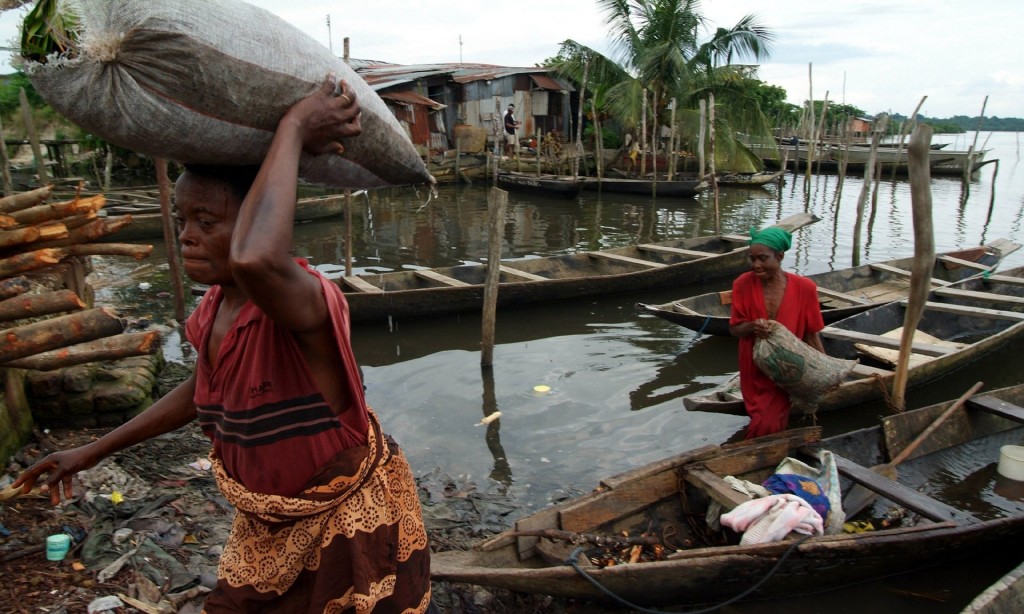
The fisherwomen of the Niger delta are legendary across west Africa. Fishery has been a female domain for generations, with women making a key contribution to family and community livelihoods.
But in recent years, their livelihoods have been undermined. Oil and gas pipelines have destroyed the delta’s fishing grounds and family incomes.
Ironically, some of these pipelines have been backed by the taxpayer-supported World Bank, whose mission is to eliminate extreme poverty. Despite promises to empower women, this project has had the opposite effect, and is just one example of bank activities that have had a negative impact on women. Gender Action, a watchdog that analysed the impact of World-Bank-financed pipelines in west African, Eurasian and central Asian countries, found that life for women was worse, not better, after the projects were completed (pdf).
While men were employed in pipeline construction, the pipelines eliminated women’s farming and fishing livelihoods. This made women more dependent on men. Some women were forced into prostitution. The number of sexually transmitted infections went up, trafficking and violence against women became more frequent, and the number of stillbirths increased – often caused by toxic pollution from inevitable pipeline leaks (pdf).
An effective World Bank gender policy could prevent these injustices and provide accountability to victims. The bank’s inspection panel investigates and recommends ways to prevent and redress harm to communities, but only if projects flout one or more of its operational policies that aim to “ensure projects are economically, financially, socially and environmentally sound”.
Lacking a robust policy, the panel has almost never responded to gender discrimination complaints. Most successful panel cases demonstrate breaches of “do no harm” safeguard policies. These policies are designed to protect the environment and the livelihoods of indigenous and involuntarily resettled peoples. But the World Bank has no gender safeguard, which is needed more than ever as it plans to double spending on “mega-infrastructure” over the next decade.
The World Bank is reviewing its safeguarding policies, which gives us an opportunity to fix this. During three consultation phases, women’s rights groups worldwide submitted content for a gender safeguard (pdf), and Gender Action sent detailed analyses and recommendations (pdf) that called on the bank to comply with international women’s and human rights standards, treaties and due diligence practices, and inform and consult equally with women and men affected by projects in local languages.
Unfortunately, the World Bank’s draft policies ignore these recommendations.
Women’s rights and gender justice groups are greatly disappointed that the draft does not include a gender safeguard, nor does it adequately integrate gender issues into the 10 existing safeguarding policies.
The draft promotes women’s land and property rights, but only in footnotes. It mentions women, sexual orientation and gender identity mostly in lists of disadvantaged and vulnerable populations. Five of the safeguards never mention gender. For example, proposed safeguards on health and natural resources are silent about women’s critical roles managing these spheres.
Our analyses revealed that women living in the Niger delta were not protected from losing their land and fisheries, and from being abused. A gender safeguard could have prevented such maltreatment and an inspection panel could have recommended compensation, training and the creation of new jobs for displaced women.
Additionally, the World Bank draft dilutes original safeguards protecting biodiversity and indigenous peoples’ forest habitats. Civil society activists who battled for years to obtain the original safeguards believe the dilutions reflect the bank’s competition for investments with new financial institutions such as the Asia Infrastructure Investment Bank and New Development Bank.
The World Bank has just approved a new strategy to achieve gender equality in its work globally. But the strategy provides voluntary guidance rather than mandatory safeguards. Even if the gender strategy were enforceable, it perpetuates the bank’s approach to advancing women’s empowerment as an instrument of economic growth without also promoting intrinsic equal rights. Both are needed.
As the draft is finalised for World Bank board approval, now is the time for the most powerful bank shareholders – the US, Japan, China and European nations – to ensure that the bank adopts and implements a robust gender safeguard that will enable women in the Niger delta and worldwide to support their families and enjoy their full rights.
• Elaine Zuckerman is president of Gender Action

